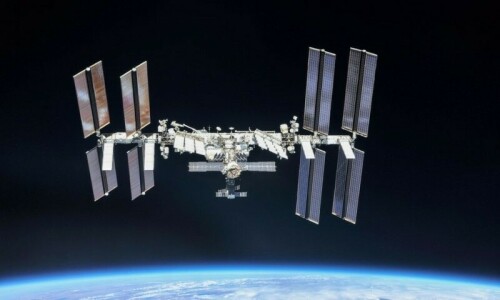WASHINGTON: Amazon’s first pair of prototype satellites for its planned Kuiper internet network were launched into space from Florida, the company’s first step before it deploys thousands more into orbit to beam internet service globally and compete with SpaceX’s Starlink.
A United Launch Alliance Atlas 5 rocket emblazoned with the Amazon logo lifted off from Cape Canaveral on Friday (1800 GMT), carrying the two Kuiper test satellites, a long-awaited mission Amazon initially had intended to launch using different rockets.
The mission aims to test Amazon’s first pieces of technology in space as the e-commerce and web services giant looks to deploy 3,236 more satellites in the next few years and offer broadband internet globally, a feat Elon Musk’s SpaceX is targeting with its nearly 5,000 Starlink satellites in orbit.
In the days leading up to the launch, Amazon divulged few specifics about the two satellites, which were built at its satellite plant in Redmond, Washington.
The launch livestream hosted by the United Launch Alliance, the Boeing-Lockheed joint venture, ended shortly after the rocket’s liftoff without showing the deployment of the satellites. Amazon later said the two satellites were deployed and its mission operations center had made contact with them.
Amazon has vowed to invest $10 billion into its Kuiper project, which was announced in 2019, the year SpaceX began deploying its Starlink spacecraft.
The US Federal Communications Commission requires Amazon to deploy half its planned satellite constellation by 2026.
With Starlink making SpaceX the world’s largest satellite operator, Amazon’s other rivals include Canada’s Telesat, which has not yet launched satellites, and French satellite firm Eutelsat’s OneWeb, which mainly offers its internet service to governments and businesses.
Like SpaceX, Amazon aims to target individual consumers and enterprise customers with Kuiper, pulling from its devices playbook to build consumer terminals at a company cost of $400 each — though it has not yet announced prices. SpaceX’s consumer Starlink terminals are priced at $599 each.
To deploy the rest of the Kuiper network, Amazon last year announced a bulk launch deal for 83 launches — the largest commercial rocket procurement ever — from various rocket companies, including Jeff Bezos’ Blue Origin, ULA and Europe’s Arianespace.
Published in Dawn, October 8th, 2023















































Dear visitor, the comments section is undergoing an overhaul and will return soon.